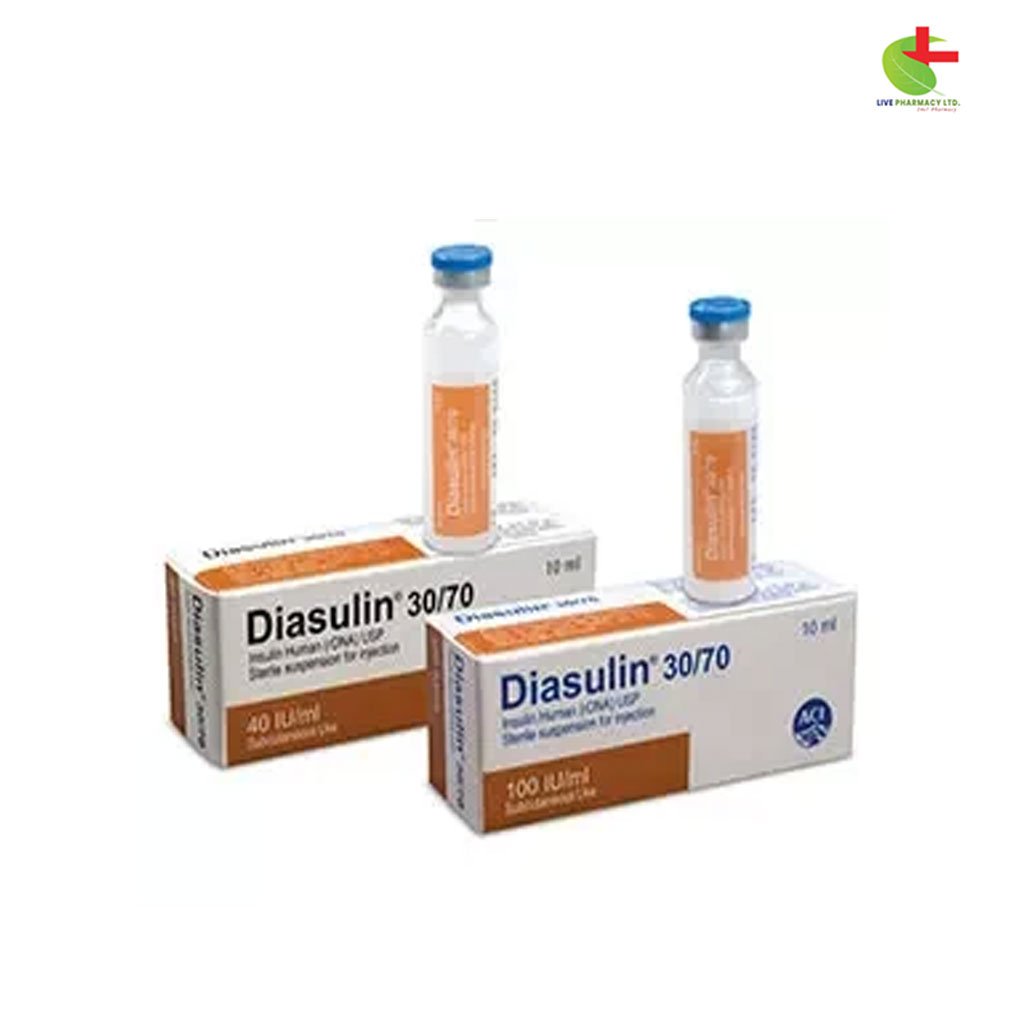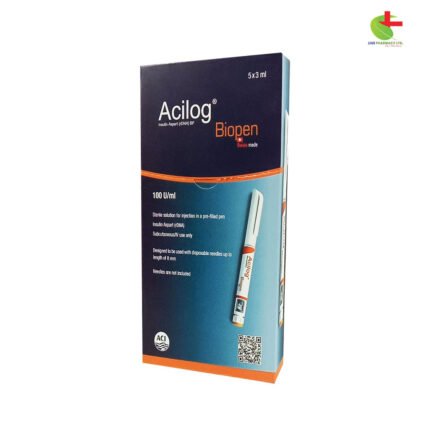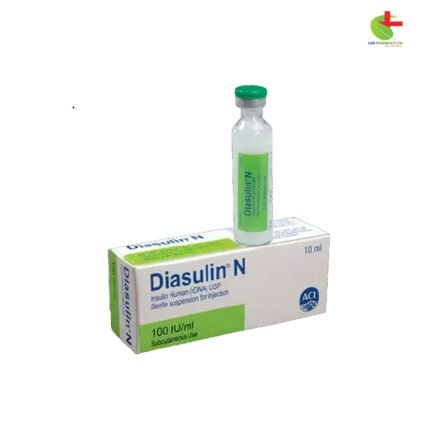Diasulin 30/70 100IU
415.00৳ Vial(10ml)
- Diasulin Injection is used for the treatment of type 1 and type 2 diabetes, including stabilization during diabetic ketoacidosis and stress conditions.
- Available in 30/70 and 50/50 formulations, it combines regular and isophane human insulin.
- Administered via subcutaneous injection, its effects include a 30-minute onset, with peak plasma levels between 1-3 hours and a duration of 18-24 hours.
- Dosage varies based on individual needs, requiring proper adjustment under medical supervision.
 Brand
Brand
|
ACI Limited |
|---|---|
 Generics
Generics
|
Regular Insulin Human + Isophane Insulin Human |
 Type
Type
|
SC Injection |
Indications
Diasulin injection is prescribed for:
- Managing type 1 diabetes in all patients.
- Treating type 2 diabetes patients who cannot achieve adequate control through diet or oral hypoglycemic medications.
- Stabilizing diabetes during diabetic ketoacidosis, hyperosmolar non-ketotic syndrome, or periods of stress (e.g., severe infections, major surgeries).
- Managing gestational diabetes.
Take medication as directed by a registered healthcare professional.
Composition
30/70 Formulation: Each ml contains 100 IU (equivalent to 3.47 mg) Insulin Human (rDNA), comprising 30% Regular Insulin Human and 70% Isophane Insulin Human.
50/50 Formulation: Each ml contains 100 IU (equivalent to 3.47 mg) Insulin Human (rDNA), comprising 50% Regular Insulin Human and 50% Isophane Insulin Human.
Pharmacology
The glucose-lowering effect of insulin occurs via increased glucose uptake by muscle and fat cells and reduced glucose production in the liver. Insulin has a short half-life in the bloodstream and does not significantly bind to plasma proteins.
Typical action profile after subcutaneous injection:
- Onset: Within 30 minutes.
- Peak Plasma Levels: 1–3 hours.
- Duration: Approximately 18–24 hours.
Dosage
Dosages are individualized and determined by the physician based on patient needs.
- For type 1 diabetes maintenance: 0.5–1.0 IU/kg daily. In pre-pubertal children, this ranges between 0.7–1.0 IU/kg daily.
- For type 2 diabetes: Initial doses are typically 0.3–0.6 IU/kg daily.
- Important: Administer the injection 30 minutes before a meal or snack containing carbohydrates.
Take medication as directed by a registered healthcare professional.
Administration Guidelines
- Inject subcutaneously in the abdominal wall, thigh, gluteal region, or deltoid region.
- Rotating injection sites within the same area helps prevent lipodystrophy.
- The abdominal wall provides faster absorption compared to other sites.
Dosage Adjustments
- Insulin requirements may increase during illnesses (e.g., infections, fever) or stress.
- Renal or liver impairments may necessitate lower doses.
- Changes in physical activity or diet may also require adjustments.
- Switches between insulin types or brands must be supervised by a physician.
Precautions Before Use
- Confirm the insulin type before administration.
- Inspect the cartridge for damage, leakage, or irregularities in appearance.
- Do not use insulin if it’s frozen, improperly stored, or not uniformly white and cloudy after mixing.
Mixing Instructions:
Shake the cartridge gently up and down (20 times before first use, 10 times before each injection) until the liquid appears evenly white and cloudy. Complete injection promptly after mixing.
Injection Technique:
- Use the technique specified in the delivery system manual.
- Keep the needle under the skin for at least 6 seconds to ensure complete dose delivery.
- Remove the needle after injection to prevent leakage.
Drug Interactions
Decreased Insulin Requirement:
- Oral hypoglycemic agents, MAOIs, beta-blockers, ACE inhibitors, salicylates, and alcohol.
Increased Insulin Requirement:
- Thiazides, glucocorticoids, thyroid hormones, beta-sympathomimetics, growth hormones, and danazol.
Important Note:
Beta-blockers may mask hypoglycemia symptoms and delay recovery. Alcohol can intensify and prolong the hypoglycemic effects of insulin.
Contraindications
- Patients with hypoglycemia or hypersensitivity to human insulin or any excipients should avoid use.
Side Effects
Common adverse effects include:
- Hypoglycemia (if the insulin dose exceeds requirements).
- Lipodystrophy (from not rotating injection sites).
- Generalized hypersensitivity reactions, such as skin rash, itching, or gastrointestinal discomfort.
- Potentially severe allergic responses, including angioedema or respiratory distress.
- Temporary edema upon initiation of therapy.
Pregnancy & Lactation
- Insulin therapy is safe during pregnancy as it doesn’t cross the placental barrier.
- Insulin requirements often decrease in the first trimester but increase in the second and third.
- Post-delivery, insulin needs rapidly return to pre-pregnancy levels.
- Insulin therapy is also safe for nursing mothers.
Overdose Effects
Mild Hypoglycemia: Treat with glucose or sugary products.
Severe Hypoglycemia: Administer Glucagon (0.5–1 mg) intramuscularly or glucose intravenously.
After recovery, oral carbohydrate intake is recommended to prevent relapse.
Storage Instructions
- Store insulin at 2°C–8°C (refrigerated).
- Do not freeze insulin or expose it to excessive heat or sunlight.
- Cartridges in use can be stored below 25°C for up to 6 weeks or below 30°C for up to 4 weeks.
- Protect insulin from light and mix thoroughly b













Reviews
There are no reviews yet.